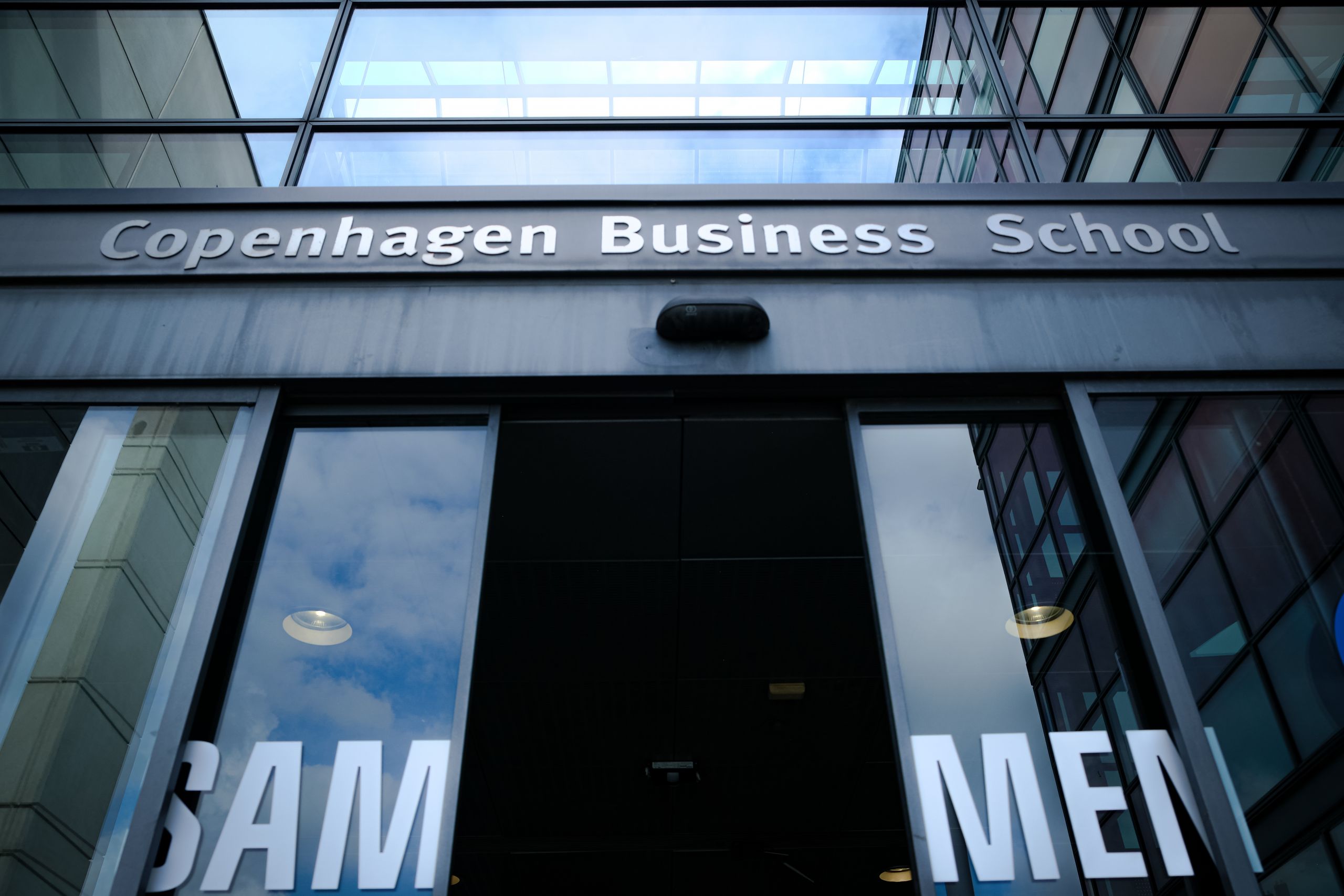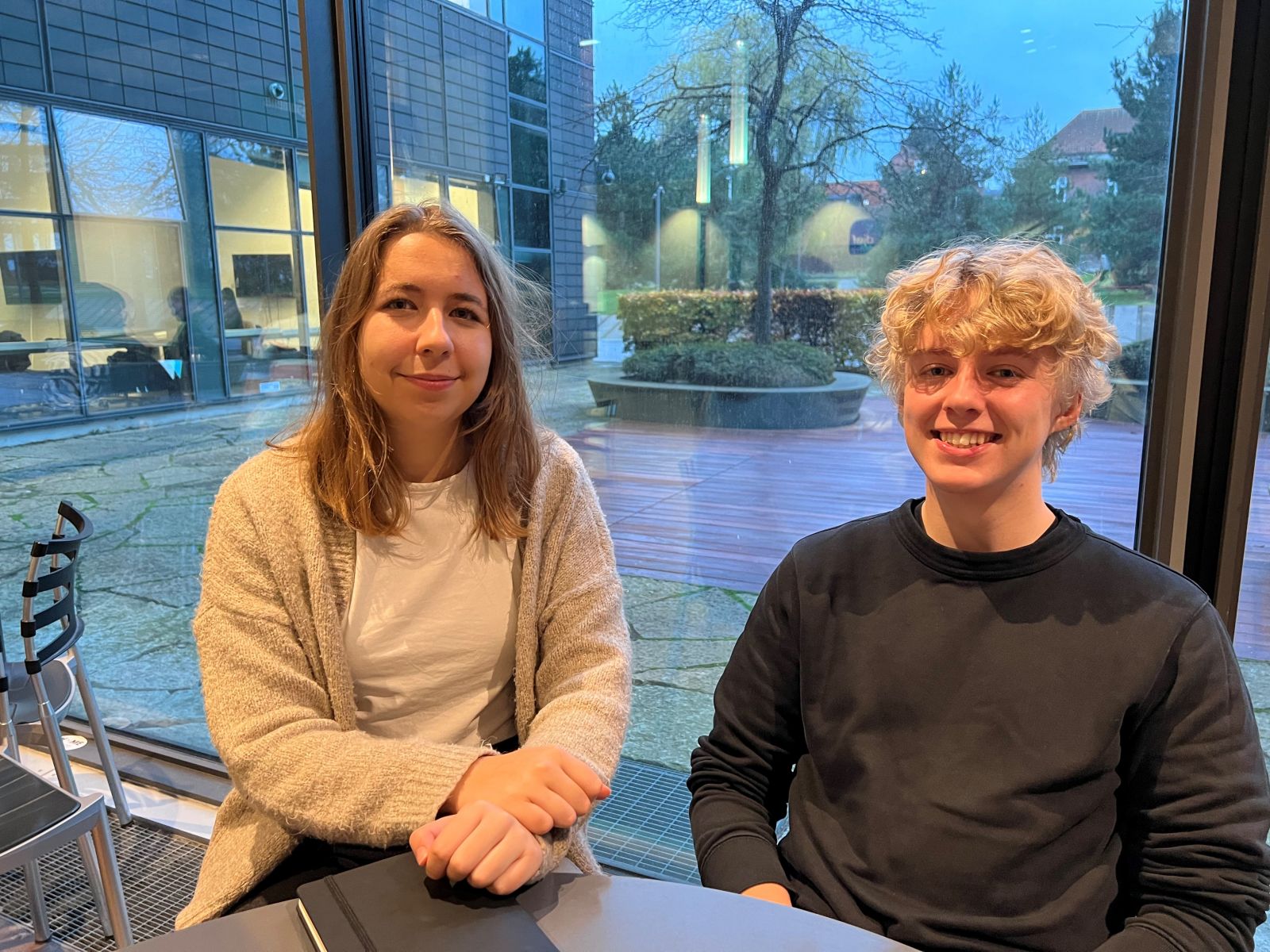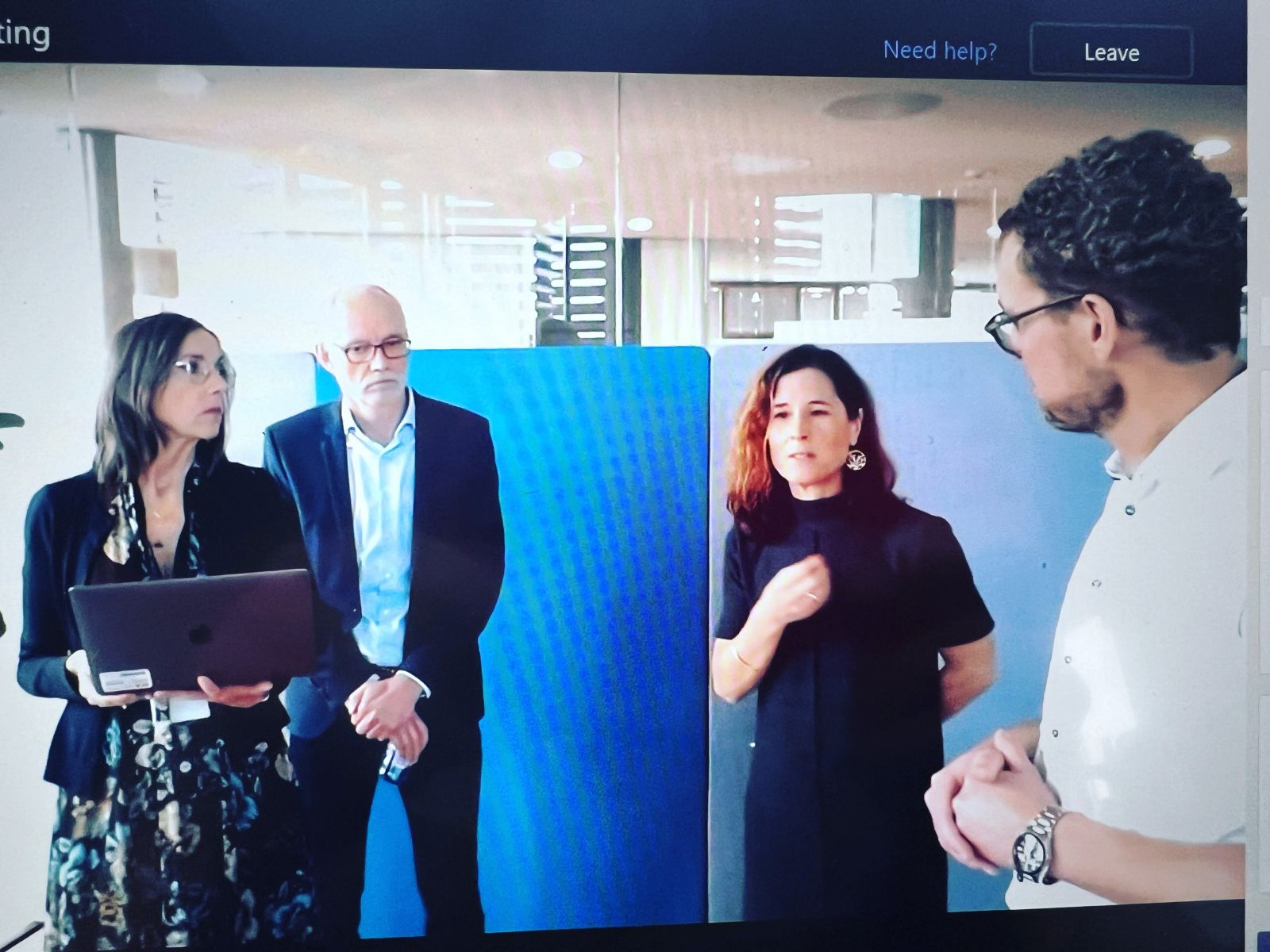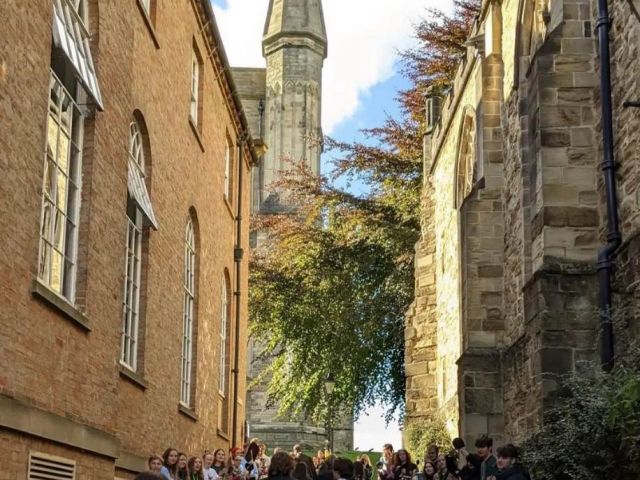Current MSc EBA (cand.merc.) academic areas to find new homes in the future programme portfolio

Photo: Anna Holte
Confusion, crisis meetings and – hopefully – clarification. The MSc EBA (cand.merc.) reform, which proposed cutting four of the current 14 concentrations from 2024 onwards, has sparked criticism. CBS WIRE sums up the main questions from faculty and students and puts them to President Nikolaj Malchow-Møller and the Programme Director for the MSc (cand.merc.) programmes, Henrik Sornn-Friese.
Some stay, some go – but where? On 3 November, Senior Management published the proposed MSc EBA (cand.merc.) reform to be effective from 2024, with four of the 14 programmes discontinued. Last week, Senior Management attended both an online Teams hall meeting and a dialogue meeting with mainly students. They faced many critical questions, not least in the online chat forum – in parts echoing the criticisms raised by the Academic Council and reference group.
Faculty questions centred on the criteria applied for closing the selected concentrations despite e.g. the high rankings, how the reform fits the overall CBS strategy and Nordic Nine, and the way the decision to close was communicated. On Friday, an opinion piece by a student in CBS WIRE criticised the lack of time for proper student involvement: a mere seven days.
Despite being pressed for time, CBS Students conducted a survey in the week leading up to the dialogue meeting, collecting 65 questions and comments in all. The trend is clear: the responding students protest the loss of concentrations centred on marketing, strategy and leadership, and are concerned that CBS will be less relevant as a business university without them.
Faculty and student criticisms
Both faculty and student fora feel the process has been too rushed and that the reform plans came as a surprise.
Mikkel Wallind, President of CBS Students: “The students we have been in contact with ask why they haven’t heard about this before, since it will affect their master’s degree options.”
Emilia Caliskan, Director of Politics at CBS Students says: “The dissatisfaction lies in the feeling that this was not what they signed up for – CBS has been chosen by many students for the specific selection of master’s programmes.”
Both are frustrated with the way students were not consulted: “Why have bachelor’s students not been asked? There has not been enough student involvement – again. It’s too little, too late.”
Kristian Miltersen, professor and Chairman of the Academic Council says: “We need to know about the burning platform, the reason why the number of concentrations must be reduced. The work on the new MSc (cand.merc.) GMA (General Management and Analytics programme has been going on since 2019? Why are 10 concentrations OK, but not 14? Is the accreditation too much administrative work? Are the demands from the Ministry speeding up the process, or is it a question of resources? It’s important to know why things have to be changed.”
Anne Reff Pedersen, professor and Vice Chairman of the Academic Council points to the fact that only five of 11 departments have seats on the study board. This means that many departments have not been involved in the decision.
She adds: “The concentrations suggested to be closed are all popular, even more popular than some of the proposal’s remaining programmes”.
The Academic Council, reference group and also the MSc (cand.merc.) Study Board have criticised the lack of time and absence of data on the popularity of the new MSc EBA (cand.merc.) programme as a basis for reform.

Answers to the concerns
CBS WIRE has asked President Nikolaj Malchow-Møller to elaborate on the burning questions.
Why the rush? Does the decision to cut the number of concentrations have to happen so fast?
“Ideally, this reform should have been effective from 2023, when we open the new MSc (cand.merc.) in General Management and Analytics. But also realising that the students currently in their fifth semester have already picked electives in expectation of a particular concentration in 2023, we have decided to maintain all the current 14 concentrations in 2023 on top of the newly opened MSc (cand.merc) in GMA. From a student perspective, that’s an attractive solution for 2023 but it comes without extra resources. It’s not sustainable for more than one year. It will require extra work to run an extra programme in 2023, and without extra resources, that will eventually impair the quality. That’s why we need a new solution at least from 2024.
Ideally, when students approach their fifth semester and start planning their electives, they should know what to expect a year later when beginning their master’s. So it’s important to get this reform in place now so students embarking on a master’s in 2024 will know how they can plan their electives in their fifth semester.”
That part of the explanation is about future graduate students and the finances involved. The next part is rather technical. The Ministry of Higher Education and Science has questioned the current setup with one MSc (cand.merc.) (the EBA) divided into 14 concentrations. ‘Unacceptable’ is the message. You must have 90 ECTS points of core constituting elements – and the concentrations do not comply. In essence, they differ from each other.
All 14 concentrations will be discontinued – with the remaining number reemerging as programmes that require accreditation. That is a time-consuming process. Therefore, so that the remaining number of what will be programmes from 2024 can continue, the accreditation applications for the Ministry must be submitted by 1 February 2023 to enter into what CBS hopes can be an administrative fast track process. For this to happen, the new programmes must be largely the same as the former concentrations.
“To have concentrations ready as programmes from 2024, we need to start the accreditation process very soon. Actually, we should have started a couple of months ago, but decided to postpone the decision so we could discuss the different solutions with the organisation and students,” explains President Nikolaj Malchow-Møller.
Misunderstandings about methodology
Many critical questions have focused on the method and criteria used to arrive at the particular selection of concentrations. At the dialogue meeting, you referred to this as a misunderstanding?
“I’ll put it this way: the reference group and Academic Council have interpreted the proposal in a different way than intended by the study board. Senior Management asked the study board to make an overall academic assessment of the portfolio and make sure programmes differ. Not to introduce a contest between the concentrations using hard criteria to select those to be discontinued.”
The President of CBS believes that part of the confusion stems from the fact that the approach used last year relied on hard criteria, such as unemployment rates, to close programmes. The MSc (cand.merc.) concentrations have generally very low unemployment rates.

For an explanation about the methodology used, CBS WIRE turned to Henrik Sornn-Friese, Programme Director for MSc (cand.merc.) and head of the study board responsible for the initial proposal.
“It is key to emphasize that this reform pertains to the cand.merc programme portfolio only, not the CBS-wide masters’ programme portfolio. The new situation is that around 1,000 bachelor students have a legal claim to the GMA programme. In terms of capacity, the worst-case scenario in real life would mean that 700 could choose the new programme.”
In this case, the other programmes would be too small to make economic sense – the break-even point is currently around 95 students per concentration. That is why the study board was given the task of reducing the number.
“The other mandate was that the new programmes should be clearly differentiated from the new GMA, which has a holistic approach that enables graduates to work across domains in business. This means the rest of the cand.merc. programmes should be more clearly specialised within a domain, instead of across several domains.”
The so-called domain model became a basic mechanism used to filter the concentrations and attempt to pinpoint them in a certain domain. GMA is cross-functional and thus placed in the centre, surrounded by four domains divided into eight subdomains. With no new or merged concentrations at this point.
“The confusion and criticism may stem from the various mentioned in the proposal. Maybe we have not been clear enough. In fact, there was one academic approach, typical for how the study board works. By the time we met the borderline cases – what to choose or not, we had collected more than 200 pages of background data, including data on student applications and admission patterns as well as labour market data (employment and salary) and student evaluations of courses and concentrations, but only to provide support for our decision. The academic assessment was already made,” says Henrik Sornn-Friese, emphasising that the choices did not come out of the blue:
“Let me elaborate on how we did it: we went through the course catalogue and plotted all 14 x 8 courses into the domain model – to find out where each concentration fits in the model. We then sent out the model to the concentration coordinators and asked them to plot in their concentration.”
The result was quite clear – some concentrations were unambiguously placed in one or maybe at the intersection of two domains. And some were “all over the place.” And that was problematic in terms of differentiating from the GMA, which is itself cross-functional in nature.

New homes for homeless areas
The next question is: What about the areas disappearing from the MSc (cand.merc.) programmes by 2024? Will they be homeless – or disappear from CBS?
Nikolaj Malchow-Møller wants us to step back from the crisis metaphor, as the situation is completely different from last year, when programmes had to be closed because of the government’s plan to move study places from the big cities.
“I believe it’s also important here to look at this as a golden opportunity to create attractive portfolios of master programmes in total. We constantly need to ensure we are attractive to students and employers. We’re not cutting our student intake, we’re not expecting a decrease in our revenue this time. On the contrary, we’re opening a new and very exciting programme and, consequently, we are looking at the portfolio and suggesting closing MSc (cand.merc.) concentrations.
We are very much aware that this affects faculty and some of the areas that are taught. And that is why a process will start early next year to figure out where the teaching competences, courses and the resources freed up by this reform can find new homes elsewhere.”
The MSc EBA (cand.merc.) study board has several suggestions and thoughts on that subject, but Nikolaj Malchow-Møller emphasises the importance of broad involvement across CBS – this is not only about a MSc EBA (cand.merc) reform:
“This reform process will have consequences for and will interact with the other programmes. One thing I would like us to get better at in the future is developing programmes with the entire portfolio in mind – not just developing in silos. Because changing one programme has implications for the rest of the portfolio. That’s what this process illustrates. It’s important to involve all the other departments and all the other programme directors.”
Early in the new year, a restart of the graduate programme portfolio review will be headed by Anna Thomasson, the new Dean of Education, in close cooperation with Deputy President Inger Askehave, and also involving the above.
As President of CBS, do you expect all the core areas now being cut from the MSc to find new homes elsewhere?
“I expect core areas to live on in different ways. They could merge with other programmes inside or outside the MSc (cand.merc.) portfolio, electives, minors, and some faculty might have to teach different courses in the future.
Should faculty members teaching on discontinued courses now fear layoffs?
“No, staff shouldn’t fear layoffs because of the reform. Of course, there is a need for faculty teaching the concentrations that are closing to teach on other programmes in the future.
Should students fear that their preferred concentration when applying to CBS will no longer be available as a master’s programme when they reach that point?
“As a student, you can be 100 % sure that at CBS you will get a great education. You’re always guaranteed that your legal claim to a master’s programme (cand.merc) in GMA, will be there waiting for you when you graduate with your bachelor’s degree – no matter what. And we want to make sure that the legal claim programme has the highest quality and that’s why so much effort has been put into developing the new GMA programme.
“On top of that, we offer bachelor’s students a number of other programmes they can apply to. Of course, we cannot promise that we’ll always know three years in advance what the entire portfolio will look like. That would make us extremely inflexible and unable to respond to changing demands from the labour market and students.”
Can you understand that, given the task of making sure programmes are different, some people question why four concentrations with the name Finance get to continue?
“Senior Management needs to trust the study board’s judgement here. But, as I see it, the nine concentrations clearly differ. Three of the study board’s suggestions contain the name Finance and the fourth (AEF) is the one Senior Management suggested keeping but could potentially move outside the MSc (cand.merc.) portfolio.
“It can seem like a lot. But it’s important to remember that the finance programmes are in high demand both with students and employers. The programmes teach Finance in connection with quite different disciplines and are clearly distinct.”
Henrik Sorrn-Friese adds:
“Finance is what students have been applying for since the 90s. There is an unconditional demand for this on all parameters: measured on students, employers, salaries, and unemployment. The concentrations that will be relaunched as programmes within the finance domain are distinct programmes – they are not ‘finance’ programmes but rather cross-disciplinary programmes containing courses in the area of corporate finance to different degrees.”




































































































































For students: For specific questions or guidance, please ask STUDENT GUIDANCE SERVICES: https://www.cbs.dk/uddannelse/kandidat/kontakt-kandidat
What about students like me, who for different and or private reasons have had to take 4 years to complete their bachelors and therefore wont be done before 2024 (and also have already selected their electives based on the current concentrations) who were planning to study some of the closed concentrations? This puts us in a bad position – we now dont fulfill the specific ECTS requirements of other universities offering these kinds of concentrations now. Other universities where we Will have to go to now.